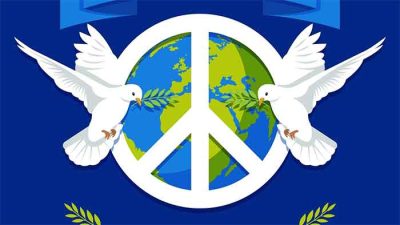Religious Leaders and Scholars Should Unite to Help in Creating a Safe World of Justice Based Peace

In most religions and their scriptures we find very important messages of justice and peace. These can be very helpful for creating a world based on justice and peace.
Unfortunately if we look at the real-life history of the world, we find simply too many instances of religion being used very wrongly to promote not just injustice and violence but even wars and genocides.
To this we should add another contradiction. When several religious leaders speak about their own religion, they speak about the positive aspects but when they speak about other religions then they openly or subtly highlight the negative aspects.
When Mahatma Gandhi was asked to explain such contradictions, he advised that when you are reading the scriptures of a religion, then read these from the perspective of the followers of that religion instead of only trying to find any flaws or objectionable passages.
If we follow this advice, then despite all the earlier misuse of religion for promoting sectarian violence and various injustices, still there is a lot of hope for various religions to together contribute to creating a safe world based on peace and justice.
For this it is very important for the most capable and learned scholars and leaders of various religions to get together to create institutions and platforms for providing interpretations of religions which can be supportive for peace and justice. Without such guidance from those leaders and scholars who are widely respected by various religious communities, misuse of religion for spreading injustice and violence, even genocides, can continue, as we have seen even in very recent times.
I have been advocating for a very long time the need for religions to promote the cause of peace, and sometimes while speaking on this issue I have been interrupted rather rudely and asked—but can you deny that there are actually passages in several religious books which advocate the use of violence in favor of the followers of that particular religion? My answer to this is—most of these scriptures were written a long time back, and sometimes over a long time, and were influenced by contemporary contexts. What appeared relevant in a particular exceptional context is not relevant for all times. To give an example, if some people are facing a very big threat from a very hostile force at a particular time and if some violent action is advocated in this context, then obviously this is not meant for a particular context and not for all times.
Instead of getting misguided by such passages, it is important to get to the core of justice and peace message of various religions which is most needed in our times.
Another important aspect is to recognize the need for social progress in tune with changing times. What may have been desirable in certain contexts hundreds of years back cannot be said to be necessarily relevant or meaningful today; in fact what was relevant or at least acceptable hundreds of years ago may be considered highly oppressive and discriminatory today by women in particular. So religion should not stand in the way of meaningful, much needed social change and progress. At the same time, there is no universal model for such change and various cultures and religions should be free to select their own path and pace of social change and progress, and this cultural diversity should be accepted.
Within this framework, there should be a broad-based discourse among various respected religious scholars and leaders to advance the interpretations of various religious texts in accordance with a broad framework of peace, justice, basic human rights (including gender rights) and social progress. Of course in the process of this discourse there will be differences and debates among various religious leaders and scholars, but this is OK as long as there is genuine progress towards reaching widespread agreement on understanding of religions based broadly on peace, justice, non-discrimination, human rights and progress. An essential part of this discourse must to be to emphasize that there should be no discrimination or violence against anyone based on religion, religious sect, ethnicity, gender, color etc.
This process should culminate in the creation of a permanent assembly of world religions, supported by the United Nations, which creates a permanent base of scholars and leaders of various religions who are committed to religion being supportive towards peace, justice and social progress. Under their leadership the task of such scholarship and mobilization should progress on continuing basis. This effort should also get the support of all forces of justice, peace and social progress.
Various religions have important messages relating to environment protection, and this should be brought out more clearly. All this has become even most important in times when basic life-nurturing conditions of our planet need to be protected from very serious environment problems as well as from weapons of mass destruction. Surely this is a cause so important that all religions should contribute unitedly for this protection.
*
Click the share button below to email/forward this article to your friends and colleagues. Follow us on Instagram and Twitter and subscribe to our Telegram Channel. Feel free to repost and share widely Global Research articles.
Global Research’s Holiday Fundraiser
Bharat Dogra is Honorary Convener, Campaign to Save Earth Now. His recent books include Protecting Earth for Children, Planet in Peril, Man over Machine, Earth without Borders and A Day in 2071. He is a regular contributor to Global Research.
Featured image source


